- Home
- Kristin Harmel
The Sweetness of Forgetting Page 4
The Sweetness of Forgetting Read online
Page 4
“Where is your mother?” Rose asked Hope politely. “Is she coming, dear?”
Rose had so many things she wanted to say to Josephine, so many apologies to make. And she feared time was running out. Where would she begin? Would she apologize first for her many failures? For her coldness? For teaching her all the wrong lessons without meaning to? Rose knew she’d had many opportunities to say she was sorry in the past, but the words always caught in her throat. Perhaps it was time to force herself to say them, to make Josephine hear her before it was too late.
“Mamie?” Hope said tentatively. Rose smiled at her gently. She knew Hope would grow up one day to be a strong, kind person. Josephine was that type of woman too, but her character was cloaked in so many layers of defenses, spawned by Rose’s mistakes, that it was hard to tell.
“Yes, dear?” Rose asked, for Hope had stopped speaking. Rose suddenly had an inkling of a feeling that she knew exactly what Hope was about to say. She wished she could stop her before the words did their damage. But it was too late. It was always too late.
“My mom—Josephine—died,” Hope said gently. “Two years ago, Mamie. Don’t you remember?”
“My daughter?” Rose asked, sadness crashing over her like a wave. “My Josephine?” The truth came rolling in with the tide, and for a moment, Rose couldn’t catch her breath. She wondered at the tricks of the mind that washed away the unhappy memories, carrying them out to sea.
But some memories, Rose knew, couldn’t be erased, even when one has spent a lifetime trying to pretend they are not there.
“I’m sorry, Mamie,” Hope said. “Did you forget?”
“No, no,” Rose said quickly. “Of course not.” Hope looked away and Rose stared at her. The girl reminded her for an instant of something, or someone, but before she could grasp the thought, it fluttered away, just out of reach, like a butterfly. “How could I forget such a thing?” Rose added softly.
They sat in silence for a while, staring out the window. The evening star was out now, and soon after, Rose could see the stars of the Big Dipper, which her father had once told her was the saucepan of God. As her father had once taught her to do, Rose followed the line of the star called Merak to the star called Dubhe and found Polaris, the North Star, who was just beginning to open his sleepy eye for her in the endless sky. She knew the names of so many stars, and the ones she didn’t she had named herself, after people she had lost long ago.
How strange, she thought, that she couldn’t hold on to the simplest of facts, but the celestial names were written on her memory forever. She’d studied them secretly over so many years, hoping that one day they might provide a pathway home. But she was still here on earth, wasn’t she? And the stars were just as far away as ever.
“Mamie?” Hope asked after a while, breaking the silence.
Rose turned to her and smiled at the word. She remembered her own mamie fondly, a woman who had always seemed so glamorous to her, a woman whose trademarks were red lipstick, high cheekbones, and a smart, dark bob that had gone out of style in the 1920s. But then she remembered what had happened to her own mamie, and the smile faded. She blinked a few times and returned to the present. “Yes, dear?” Rose asked.
“Who is Leona?”
The words stole Rose’s breath for a moment, for it was a name she hadn’t spoken in nearly seventy years. Why would she? She did not believe in resurrecting ghosts.
“No one,” Rose finally replied. But that was, of course, a lie. Leona was someone. They all were. By denying them once again, she knew she was weaving the tapestry of deceit a little tighter. She wondered whether one day it would be tight enough to suffocate her.
“But Annie says you’ve been calling her Leona,” Hope persisted.
“No, she is wrong,” Rose told her instantly. “There is no Leona.”
“But—”
“How is Annie?” Rose asked, changing the subject. Annie, she could remember clearly. Annie was the third generation of American in her family. First Josephine. Then Hope. Now the little one, Annie, the dawn to Rose’s twilight. Rose was proud of very few things in her life. But this, this she was proud of.
“She’s fine,” Hope replied, but Rose noticed that the line of Hope’s mouth was set a bit unnaturally. “She’s been spending a lot of time with her dad lately. They spent the whole summer going to Cape League games.”
Rose searched her memory. “What sort of league?”
“Baseball. Summer league. Like the games Grandpa used to take me to when I was a kid.”
“Well, that sounds nice, dear,” Rose said. “Do you go with them?”
“No, Mamie,” Hope said gently. “Annie’s father and I are divorced.”
“Of course,” Rose murmured. She studied Hope’s face when the girl looked down, and she could see in her features the same kind of sadness she saw every time she looked at herself in the mirror. What was she so sad about? “Do you still love him?” she ventured.
Hope looked up sharply, and Rose felt terrible when she realized that it probably was the wrong thing to have asked. She forgot, sometimes, what was polite and what was not.
“No,” Hope murmured finally. She didn’t meet Rose’s eye as she added, “I don’t think I ever did. That’s a terrible thing to say, isn’t it? I think there’s something wrong with me.”
Rose felt a lump in her throat. So then, the burden had been passed to Hope too. She knew that now. Her own closed heart had repercussions that she had never imagined. She was responsible for all of it. But how could she tell Hope that love did exist, that it had the power to change everything? She couldn’t. So instead, she cleared her throat and tried to focus on the present.
“There is nothing wrong with you, dear,” she told her granddaughter.
Hope glanced at her grandmother and looked away. “But what if there is?” she asked softly.
“You must not blame yourself,” Rose said. “Some things are simply not meant to be.” Something lurked at the edges of her memory again. She couldn’t remember the name of Hope’s husband, but she knew she had never liked him much. Had he been unkind to Hope? Or was it just because he always seemed a little too cold, a little too together? “He has been a good father to Annie, has he not?” she added, because she felt she needed to say something good.
“Sure,” Hope said tightly. “He’s a great father. Buys her anything she wants.”
“But that is not love,” Rose said tentatively. “Those are just things.”
“Right, well,” Hope said. She looked suddenly exhausted. Her hair tumbled in front of her face like a sheet, obscuring her expression. In that moment, Rose was sure she saw tears in her granddaughter’s eyes, but when Hope looked up again, her achingly familiar eyes were clear.
“Have you gone out with other men, then?” Rose asked after a moment. “After the divorce?” She thought of her own situation, and the way that sometimes you had to move on, even if you’d already given your heart away.
“Of course not.” Hope hung her head and avoided Rose’s gaze. “I don’t want to be like my mother,” she mumbled. “Annie comes first. Not random guys.”
And then, Rose understood. In a flash, she remembered bits and pieces of her granddaughter’s childhood. She remembered how Josephine had searched endlessly for love in all the wrong places, with all the wrong men, when love was right there, in Hope’s eyes, all along. She remembered countless nights when Josephine left her daughter with Rose so that she could go out. Hope, who was just a little girl then, would cry herself to sleep while Rose held her tight. Rose remembered the tearstains in her blouses, and the way they always made her feel empty and alone long after Hope had fallen asleep. “You are not your mother, my dear,” Rose said gently. Her heart ached, for this—all of this—was her own fault. Who could have known that her decisions would reverberate for generations?
Hope cleared her throat, looked away, and changed the subject. “So you’re sure you don’t know a Leona?” she asked.
; Rose blinked a few times as the name pierced another hole in her heart. She pressed her lips together and shook her head. Maybe the lie wasn’t as wrong if it wasn’t uttered aloud.
“Weird,” Hope murmured. “Annie was so sure you’d called her that.”
“How unusual.” Rose wished she could give the girl the answers she sought, but she wasn’t ready, for to speak the truth would be to open a floodgate. She could feel the water surging up behind the dam, and she knew it would spill over soon. For now, the rivers, the tides, the floodwaters were still hers, and she sailed them alone.
Hope looked for a moment like she wanted to say something else, but instead, she stood and hugged Rose tightly, promising to return soon. She left without looking back. Rose watched her go, noting that darkness hadn’t entirely fallen yet; Hope hadn’t even stayed for the entire heure bleue. This made Rose sad, although she did not blame the girl. Rose knew that this, like so many other things, was her own fault.
Some time later, after all the stars were out, Rose’s favorite nurse, a woman whose skin shone like the pain au chocolat Rose used to bring home for her brother David and her sister Danielle so long ago, came to make sure she’d taken her evening doses of medicine.
“Hi, Rose,” she said, smiling into her eyes as she poured a small glass of water and opened Rose’s pillbox. “Did you have a visitor tonight?”
Rose puzzled this over, trying hard to remember. There was a flash of something, glinting in the background of her memory, but then it was gone. She was certain that she’d watched the sunset alone, as she did every night. “No, dear,” Rose told her.
“Are you sure, Rose?” the nurse prodded. She handed Rose her pills in a Dixie cup and watched as Rose swallowed and washed them down. “Amy at the desk downstairs said your granddaughter was here. Hope.”
Rose smiled, for she loved Hope, who must be thirteen or fourteen by now. How quickly time flies, she thought. Before I know it, she will be all grown up. “No,” she told the nurse. “There was no one here. But you must meet her one day. She is a very nice girl. Maybe she will come visit with her mother.”
The nurse squeezed Rose’s arm gently and smiled. “All right, Rose,” she said. “All right.”
Chapter Four
I never intended to come back here, to the bakery, to the Cape, to any of this.
At thirty-six, I wasn’t supposed to be the mother of a teenager, the owner of a bakery. When I was in school, I dreamed of moving somewhere far away, traveling the world, becoming a successful attorney.
Then I met Rob, who was in his last year of law school just as I’d started my JD. If I thought the magnetic pull of the Cape was strong, it didn’t compare to being pulled into his orbit. When something went wrong with my birth control midway through my first year of law school, and I had to tell him I was pregnant, he’d proposed the next week. It was, he said, the right thing to do.
We’d decided together that I’d take a year off to have the baby before returning to school. Annie was born that August; Rob got a job with a firm in Boston and suggested I stay home with our daughter for a while longer now that he was making more money. At first, it seemed like a good idea. But after the first year, the gulf between us had opened so wide that I no longer knew how to cross it. My days, filled with diapers, breast-feeding, and Sesame Street, held little interest for him, and I was admittedly jealous of him going out into the world each day and doing all the things I’d once dreamed of. Not that I regretted having Annie; I’d never felt that way for a second. I just regretted that I’d never had a chance to live the life I’d thought I was supposed to.
When my mother was diagnosed with breast cancer for the first time, nine years ago, Rob agreed, after many nights of arguments, to relocate to the Cape, where he’d realized he could set up shop and be one of the only personal injury lawyers in the area. Mamie watched Annie at the bakery during the day while I worked as Rob’s legal assistant, which wasn’t exactly what I’d dreamed of, but it was close enough. By the time Annie was in first grade, she was frosting cupcakes and fluting piecrusts like a pro. For a few years, the whole arrangement was almost perfect.
Then my mother’s cancer returned, Mamie’s memory began to ebb at the edges, and there was no one to save the bakery but me. Before I knew what had happened, I had become the keeper of a dream that wasn’t mine, and in the meantime, I’d lost my hold on everything I’d ever dreamed of.
It’s nearly five in the morning, and dawn is still two hours away. When I was in grade school, Mamie used to tell me that each new morning was like unwrapping a gift from God. This used to confuse me, because she wasn’t a big churchgoer. But in the evenings, when my mother and I would visit for dinner, we’d sometimes find her on her knees at the back window, praying softly as the light fell from the sky. “I prefer to have my own relationship with God,” she told me once when I’d asked her why she prayed at home instead of at Our Lady of the Cape.
This morning, the smells of flour, yeast, butter, chocolate, and vanilla dance through the kitchen, and I breathe in deeply, relaxing into the familiarity of it all. From the time I was a little girl, these scents have always reminded me of my grandmother, for even when the bakery was closed, even after she’d showered and dressed at home, her hair and her skin still carried the perfume of the kitchen.
As I roll out piecrusts and add more flour to the industrial mixer, my mind isn’t on the tasks at hand. I’m thinking about Mamie’s words last night as I methodically go through the motions of the morning preparations. Check the timer for the chocolate chip meringues in oven 1. Roll out the dough for the almond rose tarts Matt Hines likes so much. Layer the baklava and slide it into oven 2. Put the softened cream cheese for the lemon-grape cheesecake into my second bowl mixer. Fold the layers of croissant around little squares of dark French chocolate for the pains au chocolat. Braid the long ropes of whole wheat challah, sprinkle it with raisins, and set it aside to rise again.
There is nothing wrong with you, dear, Mamie had said, but what does she know? Her memory is all but gone, her senses completely off. Yet there are times when her eyes look as clear as ever, and when I’m sure she’s looking directly into my soul. Although I never doubted that she and my grandfather loved each other, theirs always seemed to be a relationship of function more than romance. Had I had that with Rob and thrown it away because I believed there was more out there? Perhaps I’d been a fool. Life isn’t a fairy tale.
The timer on oven 1 goes off, and I move the meringues to a baking rack. I turn the oven on and prepare to slide the pains au chocolat in. I’ve started making a double batch of those in the mornings; they go more quickly now that it’s autumn and the air has turned cool. Our fruit tarts and pastries are more popular in the spring and summer months, but the denser, sweeter confections seem to bring people comfort as winter approaches.
I started helping Mamie in the bakery, the way Annie helps me now, when I was eight. Every morning, just before the sun came up, Mamie would stop what she was doing and lead me to the side window that looked due east, over the winding ribbon of Main Street. We’d watch the horizon in silence until dawn broke, and then we’d go back to our baking.
“What are you always looking at, Mamie?” I’d asked her one morning.
“I am looking at the sky, my dear,” she’d said.
“I know. But why?”
She’d pulled me close, hugging me against her faded pink apron, the one she’d been wearing for as long as I could remember. I was a little scared by how tightly she was holding on.
“Chérie, I am watching the stars disappear,” she said after a minute.
“Why?” I asked.
“Because even though you cannot see them, they are always there,” she said. “They are just hiding, behind the sun.”
“So?” I asked timidly.
She released me from the hug and bent down to look me in the eye. “Because, my dear, it is good to remember that you do not always have to see something to know that it
is there.”
Mamie’s words from almost three decades earlier are still echoing in my head when I hear Annie’s voice in the doorway to the kitchen, startling me out of my fog.
“Why are you crying?” she asks.
I look up, surprised to realize that she’s right; there are tears rolling down my cheeks. I swat them away with the back of my hand, streaking wet, sticky dough across my face in the process, and force a smile.
“I’m not,” I say.
“You don’t have to, like, lie.”
I sigh. “I was just thinking about Mamie.”
Annie rolls her eyes and makes a face at me. “Great, now you decide to show some emotion.” She throws her backpack down in the corner, where it lands with a decisive thud.
“What’s that supposed to mean?” I ask.
“You know,” she says. She rolls up the sleeves of her pink long-sleeved shirt and grabs an apron from a hook on the wall, just to the left of the racks where I store the trays.
“No, I don’t know,” I tell her. I stop what I’m doing and watch as she gets a carton of eggs and four sticks of butter out of the stainless steel refrigerator and grabs a measuring cup. She moves as fluidly through the kitchen as Mamie once did.
Annie doesn’t answer until after she has creamed the butter in the stand mixer, added four cups of sugar, and cracked the eggs in, one at a time. “Maybe if you’d been, like, capable of feeling anything when you were married to Dad, you wouldn’t be divorced right now,” she says finally, over the whir of the mixer.
My breath catches in my throat and I stare at her. “What are you talking about? I showed emotion.”
She turns the mixer off. “Whatever,” she mutters. “Only to, like, send me to my room and stuff. When did you ever act like you were happy to be with Dad?”

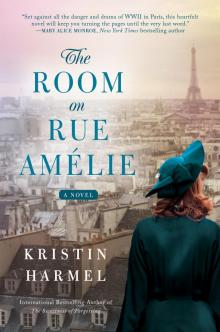 The Room on Rue Amélie
The Room on Rue Amélie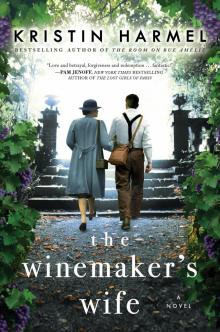 The Winemaker's Wife
The Winemaker's Wife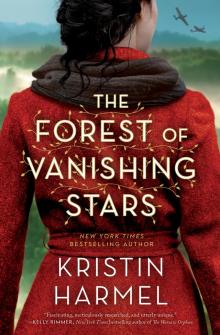 The Forest of Vanishing Stars
The Forest of Vanishing Stars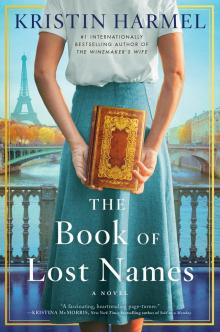 The Book of Lost Names
The Book of Lost Names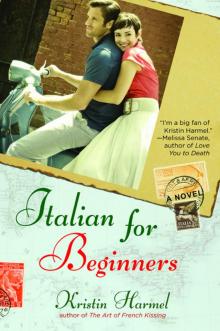 Italian for Beginners
Italian for Beginners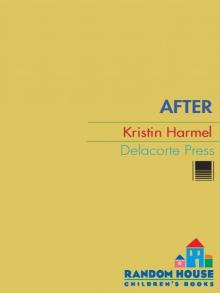 After
After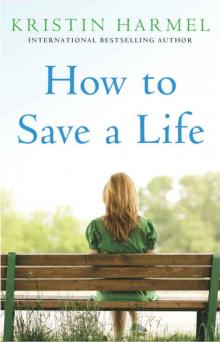 How to Save a Life
How to Save a Life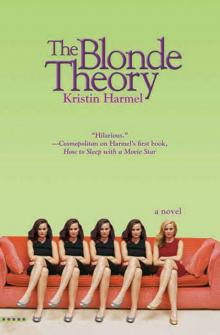 The Blonde Theory
The Blonde Theory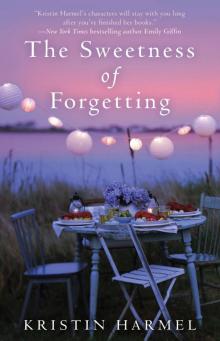 The Sweetness of Forgetting
The Sweetness of Forgetting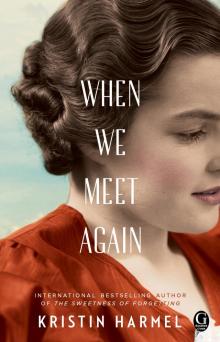 When We Meet Again
When We Meet Again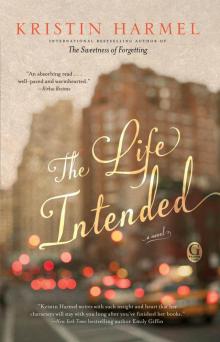 Life Intended (9781476754178)
Life Intended (9781476754178)